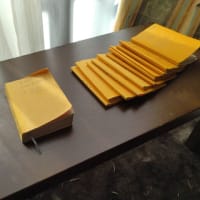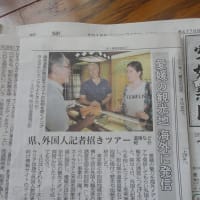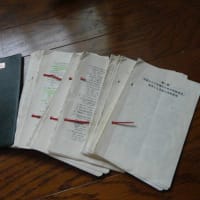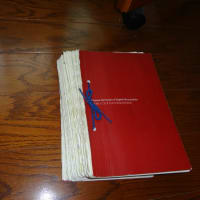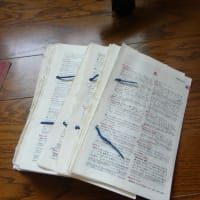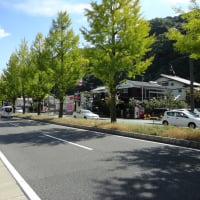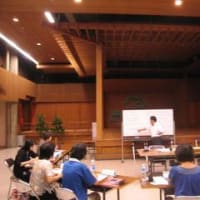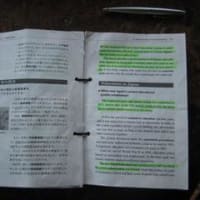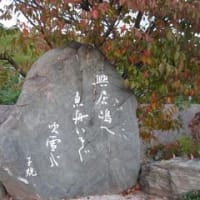バーブラ・ストライサンドが歌うThe Way We Were は追憶と訳されています。この歌は、英文法の宝庫と言えるでしょう。関係代名詞(省略)、関係副詞、仮定法等に関する文法説明用の材料がそろっています。
歌詞は以下の通り:
Memories
Light the corners of the mind
Misty water color memories
Of the way we were
Scattered pictures
Of the smiles we left behind
Smiles we gave to one another
For the way we were
Can it be that it was all so simple then?
Or has time re-writen every line?
If we had the chance to do it all again
Tell me, would we? Could we?
Memories
May be beautiful yet
What's too painful to remember
We simply choose to forget
So it's the laughter
We will remember
Wheneber we remember
The way we were.....
The way we were.....
これを普通の文章にして、句読点もつけてみましょう:
①Memories light the corners of the mind. ②Misty water-colored memories of the way we were.
③Scattered pictures of the smiles we left behind. ④Smiles we gave to one another for the way
we were.
⑤Can it be that it was all so simple then? Or has time re-writen every line?
⑥If we had the chance to do it all again, tell me, would we? Could we?
⑦Memories may be beautiful, yet what's too painful to remember,we simply choose to forget.
⑧So it's the laughter we will remember,wheneber we remember the way we were......
The way we were.....
以下は文法的解説:
まず、the way we were これは関係副詞。 the way we were か又は how we were となる。
意味は、堅く言えば「私たちの昔の在り様」となり、ふつうに言えば「昔の私たち」となる。
ここは、しかし、the way how we were とはならない。the reason why S+V、と普通の関係副詞の用法では先行詞と関係副詞が連続するが、how の場合は、先行詞のthe way と関係副詞が連続することはない。なぜそうなるのかを解説したものは、どの参考書でもない。だから、簡単そうで、ここはむつかしいところかもしれない。
the smiles we left behind はweの前に関係代名詞のwhich 又はthatがあったはずだが、目的格の関係代名詞なので省略されている。
Can it be that....のitは仮主語で新主語はthat 以下の内容。can は可能性を表す助動詞。よって、that以下の内容があり得るのか?ということになる。that 節のなかのitは説明が難しいが、漠然たる過去のあれやこれやということでしょう。「当時のことは、皆、そんなに簡単なことだったろうか?」との意味。
if 以下は、仮定法過去(現在のあり得ないことを仮定し、感想を述べる)で、今もう一度すべてやり直す機会があれば、「私たちはできるかと思うかどうか教えて」と言っている。
what's too painful to remember は先行詞を含む関係代名詞whatが使われていて、「思い出すにはあまりに辛すぎること」という名詞であるが、ここでは副詞的に使われている。
the laughter we will remember はwe の前に関係代名詞があったが、目的格のため省略されたと考える。
whenever we remember the way we were のwhenever は時を表す複合関係副詞。「昔の私たちを思い出すときはいつも」の意味。
全体の意味:(伊藤和夫訳)
想い出が
私のこころの隅々に浮かんで消える
淡く水彩画のような思い出、
あの頃の私たちの想い出が
散らばった写真のように
笑った思い出が・・浮かんでは消える
互いに笑った思い出、
あの頃の・・・
あの頃のこと、しかし、すべてがそんなに簡単なことだったかしら?
時間がすべてをかえたのかしら?
今もしすべてやり直すことができるとしたら、
あなたどう思う。私たちやりなおせるかしら?できるでしょうか?
想い出は美しいかもしれない
けれども、思い出すには辛すぎる
だから忘れることにしたのよ
だから今あるのは笑いだけ
思い出すのはそれだけ
あの頃を思い出せば
今はそれだけ
それだけなの
歌詞は以下の通り:
Memories
Light the corners of the mind
Misty water color memories
Of the way we were
Scattered pictures
Of the smiles we left behind
Smiles we gave to one another
For the way we were
Can it be that it was all so simple then?
Or has time re-writen every line?
If we had the chance to do it all again
Tell me, would we? Could we?
Memories
May be beautiful yet
What's too painful to remember
We simply choose to forget
So it's the laughter
We will remember
Wheneber we remember
The way we were.....
The way we were.....
これを普通の文章にして、句読点もつけてみましょう:
①Memories light the corners of the mind. ②Misty water-colored memories of the way we were.
③Scattered pictures of the smiles we left behind. ④Smiles we gave to one another for the way
we were.
⑤Can it be that it was all so simple then? Or has time re-writen every line?
⑥If we had the chance to do it all again, tell me, would we? Could we?
⑦Memories may be beautiful, yet what's too painful to remember,we simply choose to forget.
⑧So it's the laughter we will remember,wheneber we remember the way we were......
The way we were.....
以下は文法的解説:
まず、the way we were これは関係副詞。 the way we were か又は how we were となる。
意味は、堅く言えば「私たちの昔の在り様」となり、ふつうに言えば「昔の私たち」となる。
ここは、しかし、
the smiles we left behind はweの前に関係代名詞のwhich 又はthatがあったはずだが、目的格の関係代名詞なので省略されている。
Can it be that....のitは仮主語で新主語はthat 以下の内容。can は可能性を表す助動詞。よって、that以下の内容があり得るのか?ということになる。that 節のなかのitは説明が難しいが、漠然たる過去のあれやこれやということでしょう。「当時のことは、皆、そんなに簡単なことだったろうか?」との意味。
if 以下は、仮定法過去(現在のあり得ないことを仮定し、感想を述べる)で、今もう一度すべてやり直す機会があれば、「私たちはできるかと思うかどうか教えて」と言っている。
what's too painful to remember は先行詞を含む関係代名詞whatが使われていて、「思い出すにはあまりに辛すぎること」という名詞であるが、ここでは副詞的に使われている。
the laughter we will remember はwe の前に関係代名詞があったが、目的格のため省略されたと考える。
whenever we remember the way we were のwhenever は時を表す複合関係副詞。「昔の私たちを思い出すときはいつも」の意味。
全体の意味:(伊藤和夫訳)
想い出が
私のこころの隅々に浮かんで消える
淡く水彩画のような思い出、
あの頃の私たちの想い出が
散らばった写真のように
笑った思い出が・・浮かんでは消える
互いに笑った思い出、
あの頃の・・・
あの頃のこと、しかし、すべてがそんなに簡単なことだったかしら?
時間がすべてをかえたのかしら?
今もしすべてやり直すことができるとしたら、
あなたどう思う。私たちやりなおせるかしら?できるでしょうか?
想い出は美しいかもしれない
けれども、思い出すには辛すぎる
だから忘れることにしたのよ
だから今あるのは笑いだけ
思い出すのはそれだけ
あの頃を思い出せば
今はそれだけ
それだけなの










